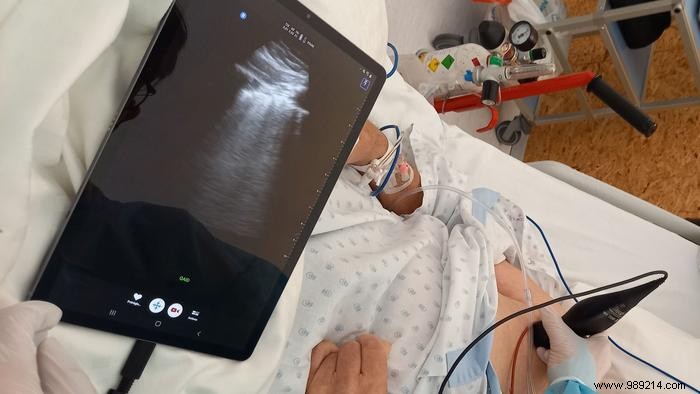Swiss researchers are developing algorithms to offer a new way to screen for the SARS-CoV-2 coronavirus. This is an innovation based on pulmonary ultrasound and other respiratory sounds. The project leaders hope to implement this technique by the end of the year.
The means currently in place to screen for the coronavirus are PCR, saliva and serological tests. However, according to a recent prepublication of the intelligent Global Health (iGH) of the Federal Polytechnic School of Lausanne (EPFL), researchers are working on another means of screening. We are talking about deep learning algorithms. The first named DeepBreath specializes in breath sounds and the second, DeepChest , focuses on lung images.
Since 2019, scientists have been collectinglung ultrasound images in patients with the SARS-CoV-2 coronavirus. Since 2017, researchers have also been collecting breath sounds . The goal? Create a smart digital stethoscope (or pneumoscope). These recordings obtained before the arrival of Covid-19 were made for Deep Chest, with the aim of distinguishing between viral and bacterial pneumonia and improving diagnoses . Today, these are part of the development of DeepBreath.

"We continue to improve and validate algorithms, and make complex black box logic easier for clinicians to interpret. We want to create robust and reliable tools, whose capabilities go beyond this pandemic" said Mary-Anne Hartley, principal director of the study.
“Artificial intelligence allows us to better understand complex patterns in these fundamental clinical examinations. So far, the results are very promising “, says Prof. Martin Jaggi of the School of Computer Science and Communications at EPFL.
Thus, this solution is a promising tool to facilitate coronavirus screening . The researchers hope that this new technique will be able to establish diagnoses by the end of the year. In addition, they believe that the algorithms could be useful in the fight against other respiratory diseases . It could also be that this solution offers an interesting response to the challenge of antibiotic resistance.
At the same time, other EPFL researchers are working on other algorithms. The aim is to diagnose coronavirus from the sound of coughing recorded from a smartphone.
At the end of October 2020, British researchers declared that they had developed a very rapid screening test also based on artificial intelligence. The method in question begins with a sample taken from the patient's throat. Then the sample is analyzed under a microscope. This makes it possible to identify markers of SARS-CoV-2 infection. Software based on a machine learning system is responsible for analyzing the sample before delivering a result in just five minutes . The first results are promising, so the scientists should commercialize their solution in 2021.